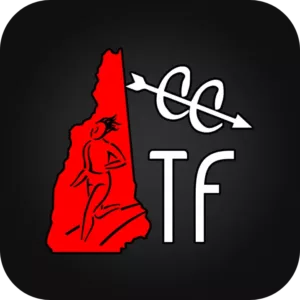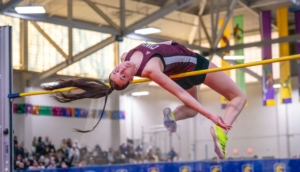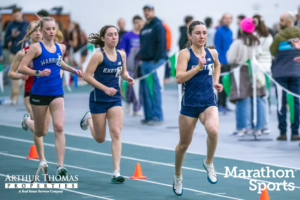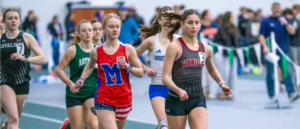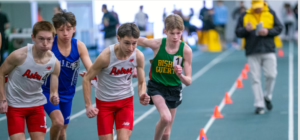Dorcas Denhartog Wonsavage is the assistant coach of the Hanover High girls cross country team. A Hanover High grad herself (Class of 1983), Wonsavage played field hockey and lacrosse in high school and did not run cross country or track. She did go out for nordic skiing her senior year. At Middlebury College, despite never having run cross country before, Wonsavage walked on to the cross country running and skiing teams. It went well: In her very first season of cross country as a freshman, she earned All-American honors placing 14th in D-3 Nationals. In 1985, her junior year, she was the NCAA D-3 individual champion. Ultimately she was a three-time D-3 All-American (1983-85) and won three New England Small College Athletic Conference titles. Wonsavage was an even better nordic skier. Wonsavage made the U.S. Olympic Team in 1988 (Calgary, Canada), 1992 (Albertville, France), and 1994 (Lillehammer, Norway). Today she is a middle school English teacher in Hanover when she’s not coaching.
 NHCC: You didn’t run in high school. Why not, what sports did you do instead, and why? Did you come from an athletic family?
NHCC: You didn’t run in high school. Why not, what sports did you do instead, and why? Did you come from an athletic family?
WONSAVAGE: I grew up hiking and alpine skiing (not racing) with my family. Summers were spent swimming and working on our island on Lake Winnipesaukee, climbing Mt. Chocorua. My best friend and I were Girl Scouts, and our goal was to hike or camp out every month of the year. We had two great leaders, women who had families and jobs, yet would spend weekends with us in the White Mountains. Those experiences provided the basis for my self-reliance and love of adventure and the out of doors. A value of teamwork, collaboration over competition, grew out of that as well.
My family was not athletic, but we were active. We cut and stacked our firewood at home, took care of a huge vegetable garden, and picked blueberries. Mom baked all our bread, made jams, and froze vegetables. And at the island, it wasn’t about sunning and swimming, it was about fixing, repairing, and building with what we had – sweat equity and the odds and ends of pipes and wood stored under the main camp. The sports and activities my friends did – swimming and gymnastics and skiing – often were after school or evenings, and my parents were not going drive my brother or me back into town (all of 8 miles, 20 miles round trip, and the expense of gas; this was the 1970s after all) and interrupt family dinner time.
When I did plead with my father to let me play field hockey in 8th grade, he relented and stayed 15 minutes later after work to come pick me up and bring me home. That started the ball rolling. I loved the smell of newly cut grass, running after the ball and getting there before anyone else, mastering the stick and ball work so that I could get past defenders, and the sense of accomplishment and the pride I felt to contribute to my team. I looked up to my older cousins, who were athletic. Francesca played lacrosse for Harvard, then the U.S. National Team. And when my father, a lacrosse goalie in college, stopped by a game we happened to drive by one fall at Proctor Academy, I knew I wanted to do that as well. With some encouragement from my father, and the help of my neighbor, Aggie Kurtz, we goaded the Town of Hanover Rec. Department to start a girls lacrosse club. After all, they had a boys’ lacrosse club. At first, the director did not believe me when I told him girls lacrosse was not expensive, that we did not have pads and helmets like the boys. When Aggie heard that she offered her top field hockey coach to coach our first girls’ team. So he had to let us form the team in 1981.
NHCC: How did you come to distance running? Tell us about your college running experiences at Middlebury.
WONSAVAGE: It was two of my fellow geeks who got me into running. Winter, my high school senior year, 1982-83, was a bad snow year. With nordic ski practice cancelled, I was out running after school and ran into Rolf Sonnerup and Nord Samuelson. They pointed out, “Hey, if you ran this far, you should go out for Spring Track!” When I pointed out I was the captain of the lacrosse team, they wily countered that I could do both lacrosse – a rec. club – and high school track. Luckily, the coaches were ok with that. I ended up qualifying for the mile and 2 mile at New Englands. Both Rolf and Nord were tremendous runners, coached by Jim Eakin – so I was honored that I could run with these guys, who I so admired for what they did in our science classes as well as out on the trail and track.
I fell in love with the individual sports that required what I had – determination, discipline, aerobic capacity, & the ability to be alone with myself – and little of what I didn’t have – an outgoing, overtly competitive personality.
I’d been accepted early decision to Middlebury, so maybe the coaches knew they had a lacrosse/field hockey player coming in. But I knew I wanted to run and ski. I visited Terry Aldrich, the Middlebury cross country ski and cross country running coach the spring before I started at Middlebury. He had no idea who I was. I’d never done a race that he would have had results for. But he kindly drew up a training plan for me, in no way indicating that he had full reason to doubt that he’d see me that fall.
That was my best summer ever – I ran, tried out rollerskis, swam, biked, hiked, and taught myself to scull, before and after lifeguarding at the local pool. When I arrived at Middlebury, I ran my first season of cross country and loved it – my teammates, the training, the out of doors. Running was D3, and Terry coached both running and skiing, so he was able to overlap the training for skiers who wanted to run. Although my high school coach had told me “Dorcas, don’t even think of skiing on a Division I ski team,” I knew I wanted to ski as beautifully as Tara Prince, one of my high school teammates, and I wanted sculpted forearms, like Joe Holland, and a tanned face in February like they did, from racing at Junior Nationals in Colorado. So my focus was to just to master the snow dance that is cross country skiing. I had no expectations or understanding of result goals; I just wanted to do my best. That, along with the kind, experienced coaching of Terry, I won Junior Nationals a year later.
And that high school coach who tried to warn me not to expect too much? A year later I saw him, and he gave me a big hug. “Dorcas,” he said, “I’m glad you proved me wrong.” It’s a tremendous motivation, to break other people’s limited expectations of what can be done, what you can do. I ran D3 cross country and skied D1 cross country all four years.
NHCC: What changes have you seen in womens’ running and  sports since you were in high school? It seems like you came along right on the pioneering edge for women endurance athletes. Am I wrong?
sports since you were in high school? It seems like you came along right on the pioneering edge for women endurance athletes. Am I wrong?
WONSAVAGE: I appreciate every day that my experiences as a female athlete are due to the women who went before me – who ran the Bonnie Bell 10ks, the LA women’s marathon (I watched Joan Benoit Samuelson run the marathon on television and knew I wanted to do something like that), who made up the “Red Rose Crew” – the women’s rowing eight, and the women of the 1972 Winter Olympic XC Ski Team, as well as people like Aggie Kurtz, the first coach hired by Dartmouth to coach women’s teams – lacrosse and squash – and my neighbor, who helped me start the Hanover Girls Lacrosse Club. Because of the inequities they worked through, I had access and support and importantly, encouragement, to pursue athletics. I came into a period when it was ok for women to “sweat, not just glow.”
NHCC: How did you end up in the Olympics? What were those experiences like? What are some of your favorite memories?
WONSAVAGE: As a junior skier in college, I was identified by the U.S. Ski Team as a promising skier, so I was part of the Project ‘92 Team, for the 1992 Olympics. But things went more quickly, and I qualified for the 1988 Olympic Team. At the Calgary Olympics I had my best results – leading the women’s 4x5km relay, and placing 23rd in the 20km skate race. The steep, hilly terrain, the newness of the skating technique, as well as the lack of expectations on my shoulders were in my favor. The following year I made a bad decision – to move to altitude and train with an inexperienced coach. I overtrained and under-ate because I was cheap and had poor food choices at the cafeteria. I paid for that mistake for the next four years; I was never able to recover. I did manage to make the 1992 Winter Olympic Team, in Albertville, France, in which I raced the 30km classic event, and the 1994 Winter Olympic Games in Lillehammer, Norway, where I raced the 30km skate. Lillehammer was my favorite Olympics. Norway is the best place to hold a celebration of winter sport. But it was the opening ceremonies at Calgary, when I walked into the stadium with the U.S. team and looked at all the spectators, that I realized the enormity of what I’d accomplished. Everyone looking at us wanted to be me, be one of us.
NHCC: Hanover always has top-tier running teams, whether it was under the guidance of long-time coach Jim Eakin or current head coach Eric Picconi. How did you come to coaching at Hanover, what is your role, and how has the program developed such long-lasting strength?
WONSAVAGE: Running around the Upper Valley and all my old training roads and trails, I eventually ran into Jim and Eric. The team had grown considerably, and with 50 to 60 runners, they needed a 3rd coach. I can’t remember who or how I found out about the position, but my first year assisting them was 2011. The variety of experience, focus, and knowledge that we each bring to the team and the sport complement and make coaching a fun, learning experience for us and for the runners. The strength of the team lies in the approach Jim refined over the years — quality of running over quantity. It’s a lifelong sport, and the goal is primarily to develop a lifelong desire to run and be a part of a team that makes you greater than yourself. Then the desire to run fast, believe that you can do what you think you cannot do, and win will follow.
Contributed By Fergus Cullen – Oyster River Girls Cross Country
He can be reached at Fergus@ferguscullen.com





